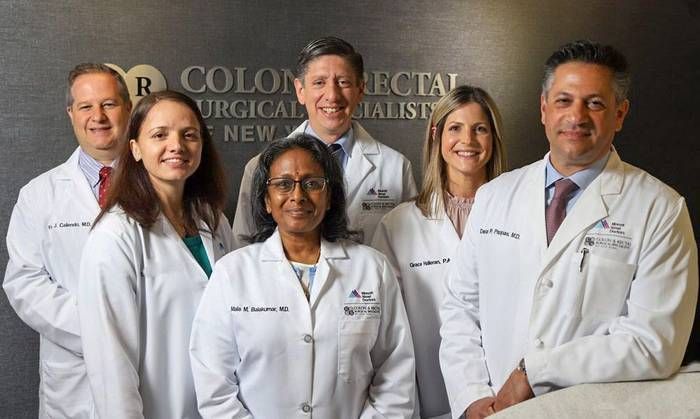
BY DEAN PAPPAS M.D.
Your colon is one of your most important, but also most vulnerable, parts of your body. Colorectal cancer is the second most common cause of cancer death among American adults. For this reason, the U.S. Preventive Services Task Force and the Centers for Disease Control and Prevention recommend that all men and women undergo routine screenings beginning at age 50. One of the most comprehensive diagnostic tests is a colonoscopy, an advanced procedure during which a colorectal surgeon uses a tiny camera to explore your colon for signs of disease. Blood analysis and other procedures can also help you identify cancer. Many patients put off these tests, but they could save you time, money, hassle, or even your life. In the following blog post, we’ll cover common colorectal cancer symptoms and explain how our Long Island team of colorectal specialists can help you detect them so you can pursue proper treatment.
What Is Colorectal Cancer?
Colorectal cancer refers to the development of abnormal, unhealthy cells and tumors within the large intestine. The colon is the primary portion of the large intestine, while the rectum encompasses the lower six inches of this organ. As with many cancers, doctors aren’t exactly sure what causes this condition, but age, diet, congenital conditions, and other factors may increase your risks. Our doctors can help you determine if you have a higher chance of developing colorectal cancer. According to recent research, about five percent of people suffer from this condition in their lifetimes.
Why Early Detection Matters
The sooner we diagnose your colorectal cancer, the more easily and successfully we can treat it. If you’ve been putting off your screening, consider the following statistics:
- Approximately 50,000 people die from colorectal cancer every year in the United States
- More than 90 percent of patients who are diagnosed in the early, localized stage of colorectal cancer survive for over five years, while just 13 percent of patients with more advanced, widespread conditions do.
- Only 40 percent of colorectal cancer cases are identified at the localized phase, but this number can increase with more aggressive testing.
Common Colorectal Cancer Symptoms
Everyone over the age of 50 should come in to our practice for screening. However, even if you are under 50, you should schedule an appointment if you experience any of the following:
- Blood in your stool or around your rectum
- Exhaustion
- Inexplicable weight loss
- Consistent cramps, gas, or abdominal discomfort
- Irregular bowel function, such as constipation, diarrhea, or changes in stool texture
- The sense that your bowel isn’t entirely empty, even after you have defecated
The above are clear signs that you may be suffering from colorectal cancer. However, it’s important to note that you may suffer from the early stages of this condition without having these symptoms. This is why proactive testing is key.
Our Screening Procedures
Our doctors can screen you for colorectal cancer using several methods. These include:
- A rectal exam. During this procedure, our doctors will look at and palpate the region around the anus, then insert a lubricated, gloved finger into the rectum to check for any abnormalities.
- An annual FOBT (Fecal Occult Blood Test). You’ll provide three stool samples in a row, which our specialists will analyze for trace amounts of blood.
- Sigmoidoscopy, which involves using a special illuminated tube to examine the rectum and colon walls. We generally recommend that patients undergo sigmoidoscopy every three years.
- Colonoscopy. This test uses an endoscope (a tiny instrument with a computer-controlled camera at its end) to conduct a thorough visual examination of the colon and remove tissue samples as needed. This more intensive screening can be performed every ten years, or more often for those with symptoms.
If You Have Symptoms
If you do have colorectal cancer symptoms, our specialists can help. We can perform minimally invasive, sophisticated surgeries using robotic and laparoscopic techniques. Our specialists may also recommend chemotherapy and radiation for more advanced cases. We will make every effort to avoid the need for a colostomy so you can retain optimal colorectal function.
Contact the Colon & Rectal Surgical Specialists of New York
Are you suffering from colorectal cancer symptoms? Are you over the age of 50? Contact us today to schedule your screening and safeguard your health.

